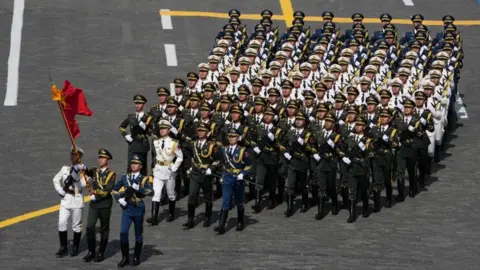Vladimir Putin Showcases Russia’s Strength at Victory Day Parade Amid Global Attention
Vladimir Putin continues to command international headlines, especially during significant national events such as Russia’s Victory Day parade. This year’s commemoration in Moscow reflected not only Russia’s military strength but also highlighted Putin’s efforts to reinforce alliances and present Russia as far from isolated on the world stage.

Russia’s Victory Day Parade: A Display of Unity and Strength
Friday’s Victory Day parade in Moscow was more than a historical commemoration. Under the leadership of Vladimir Putin, Russia marked the 80th anniversary of the Soviet victory over Nazi Germany. Thousands of troops marched through Red Square, and for the first time, significant displays of modern military hardware, including combat drones, were prominent. This annual event has become increasingly symbolic not just for remembering the past but for framing current conflicts as continuations of historic struggles. According to BBC News, Putin used his speech to link the ongoing war in Ukraine with the fight against Nazism, emphasizing Russia’s unity and resilience.
Putin and Xi Jinping: Signaling Stronger Alliances
In a significant diplomatic gesture, Chinese President Xi Jinping stood alongside Vladimir Putin during the lavish ceremony. Their presence together underscored a growing partnership between Russia and China, especially as Western nations tighten their stance on Moscow. The attendance of over twenty heads of state, including leaders from Brazil, Serbia, Venezuela, and North Korea, amplified Russia’s message: it remains a central player in global affairs. CNN reported that these leaders appeared united, many sporting the symbolic black and orange St. George ribbon. The event served as a carefully choreographed counterpoint to suggestions of Russia’s isolation.
Ceasefire Efforts, Diplomatic Tensions, and International Responses
Alongside the parades, Vladimir Putin declared a unilateral three-day ceasefire to coincide with the anniversary—a move met with deep skepticism by Ukraine and its allies. Despite Russia’s claims of observing the truce, Ukraine accused Russian troops of several violations. Both BBC News and CNN provide in-depth details on how this ceasefire was perceived as more of a political maneuver than a genuine step towards peace.
While Russia celebrated with its allies, Western nations held parallel meetings to support Ukraine and reinforce sanctions against Moscow. The diplomatic divide was further illustrated when several Baltic states closed their airspace to planes traveling to Moscow for the parade, forcing some leaders to reroute their journeys.
A Modern Parade in a Challenging Context
Vladimir Putin’s orchestration of the Victory Day parade demonstrates his strategy of consolidating domestic support while openly challenging Western narratives. This year’s event, with expanded military displays and the visible support of global partners, reaffirms his goal to portray Russia as resilient and well-connected.
For further reading about the diplomatic and symbolic importance of this year’s parade, see the BBC’s coverage and CNN’s detailed analysis.
Conclusion: Vladimir Putin and the Shifting Global Landscape
Under Vladimir Putin, Russia’s national events have transformed into statements of power and defiance. The 2025 Victory Day parade highlighted expanding international ties and ongoing tensions with Western countries. As global attention continues to focus on Putin’s next moves, the world watches Moscow’s evolving alliances and responses to current challenges.